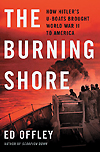
The Burning Shore: How Hitler’s U-Boats Brought World War II to America, by Ed Offley, Basic Books, New York, 2014, $27.99
For the United States, World War II began in the Pacific Ocean at Pearl Harbor, Hawaii, on the morning of Dec. 7, 1941. In the Atlantic, however, the war reached North American shores on Jan. 11, 1942, with the beginning of Operation Drumbeat, German Vice Admiral Karl Dönitz’s submarine offensive against the Atlantic and Gulf coasts. Pearl Harbor had been unprepared for an enemy air attack, and the Atlantic and Gulf Coasts were equally unprepared for defense against Unterseeboot attacks. The big difference was that while the Japanese carrier strike was widely publicized, the German undersea offensive was, and remains, little known to the general public.
In The Burning Shore Ed Offley reveals what happened during those desperate months largely through the stories of two men: the commander of a German U-boat that made four voyages to raid U.S. waters, and the pilot of the U.S. Army Air Forces bomber that eventually sank the former’s vessel. Behind the military exploits of those two men, however, lies another story, one hitherto given short shrift. Though World War II had been raging for more than two years, the United States entered the war wholly unprepared to conduct antisubmarine operations off its own coasts. Ships were sailing without benefit of convoy protection, and shore lights were making them easy targets at night. Between January 1 and the end of June 1942 U-boats sank or damaged hundreds of ships. More American seamen—most of them civilians—lost their lives on those ships than were killed in the attack on Pearl Harbor.
It took six months of heavy losses before the U.S. military finally began to regain control of the situation along the Atlantic coast. During that time the services licked their wounds and learned their lessons. The government put a brave face on the situation, playing down American losses while claiming victories that didn’t actually exist. The Burning Shore is a history of those dreadful early months of the war, a history largely suppressed at the time and rarely alluded to since.
—Robert Guttman




